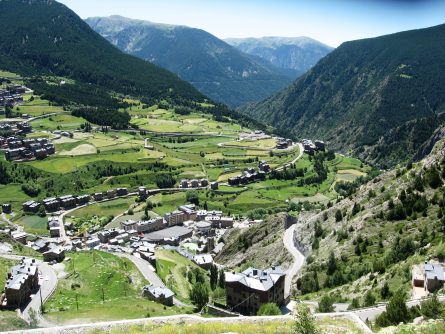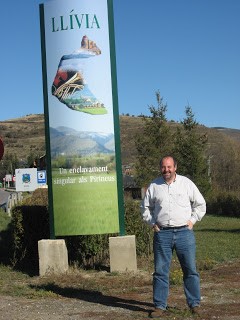Andorra, Llivia and the captivating Pyrenees. Catalonia calls.
Catalonia is a unique region. From Andorra to Llivia, the Pyrenees dominate
a fantastic landscape, and one that is well worth exploring.

What a phenomenal day; ten and a half hours, three hundred and fifty kilometres, three and a half countries and absolutely terrific company. Touring in the Pyrenees is a wonderful pastime.
In a fine indication of the extraordinary amount there is to do in the South West of France, notably the Languedoc; we decided to drive a circuit that took us high into the Pyrenees before dropping into the Andorran capital of Andorra la Vella, and then returning by driving south into Spain, toward Puigcerda close to the French border.
Finally to the rather remarkable Spanish exclave of Llivia before returning through the stunning Gorge de St Georges to home in Esperaza. A complete circuit of Catalonia.

The region never ceases to amaze me with the cornucopia of languages, topography, economies and the presence of simply silly places. Not that Andorra or Llivia are silly in and of themselves, folks in neither roll around laughing helplessly nor engage in silly walks, but neither should really exist in the 21st century, but I am delighted that they both do.

The Pyrenees are an unquestionably thoughtful, and even spiritual place. The region was home for many years to adherents of the Cathar faith, a Christian belief, but one so popular in the early part of the last millennium that the pope (indecently called Pope Innocent) called a crusade.
This crusade, the only Christian on Christian such walloping caused the deaths of over two hundred thousand in these parts, and the valleys and villages resonate with ancient memories, and even a still-fomenting belief in their ancient ways.
In any case, the question of reincarnation was a biggie; and assuming (and this is a very long-shot indeed) that after my death the parts of my soul are rearranged into something more than an ocelot or sea-anemone, I would rather fancy being Andorran.
Firstly, one would have the advantage of speaking Catalan officially; one would not be bothered by the European Union and one would live in the most picturesque land in the world; one would also have a great opening gambit at cocktail parties.
Balance this against the lack of an airport, the requirement to like mountains,a remarkably large Russian population, and one of those funny economies so loved by dodgy bankers and prone to burst rather spectacularly, and one is left with a pretty good place to live.
Heck, even reasonable football players get to take on the likes of England every so often and play at the Nou Camp in Barcelona.
But I digress. Tourists, and there are plenty of them there, arrive in droves to either ski or shop; in June it is almost all the latter. It is a tax haven, and for a population base of 90,000 offers a eye-watering selection of wrist watches, electrical goods and alcoholic refreshment.
The drive into the principality was easy, but I do remember a few years ago being required to buy tyre-chains before making the long climb up the mountain from Ax les Thermes … I was fortunate to be travelling with a couple of Icelanders familiar with these wretched devices, and knew how to put them on.
At this time of year, and under a brilliantly sunny sky, the country was simply gorgeous, and although we would have liked to linger for longer, our itinerary forced an onward rush south to the Spanish border.
This is one of the few rather serious land-borders left in Europe; wary of its citizens setting up pipelines of cheap booze and cigarettes (and presumably watches), there is a substantial customs post to navigate before arriving in Spain; actually, Catalonia if one asked an inhabitant, but the point is take.
The southern hills of the Pyrenees offer as wonderful landscapes as their northern cousins, if a touch gentler. The road to Puigcerda is marvellous, as are most roads in Spain; perfectly cambered, and a delight to drive. Small and ancient villages dot the landscape, horse farms predominate, and as is the case in much of the region, life continues to evolve as it has for eons.
Puigcerda is rather interesting. A major regional market centre of about 9,000 folks, it dominates local commerce; during the Spanish Civil War, it had an elected Anarchist Council, a very peculiar form of government if one thinks it through, and more recently was the birth place of the 2010 World Champion cross-country mountain biker.
This is a lot to ponder over a coffee, amidst a touch of reconstruction and a rather pleasant medieval town centre. But ponder it we did, and came to little conclusion other than is was a rather pleasant place to stop before heading into Llivia.
The next chapter in the day’s ride.
